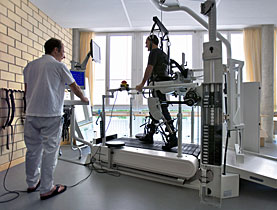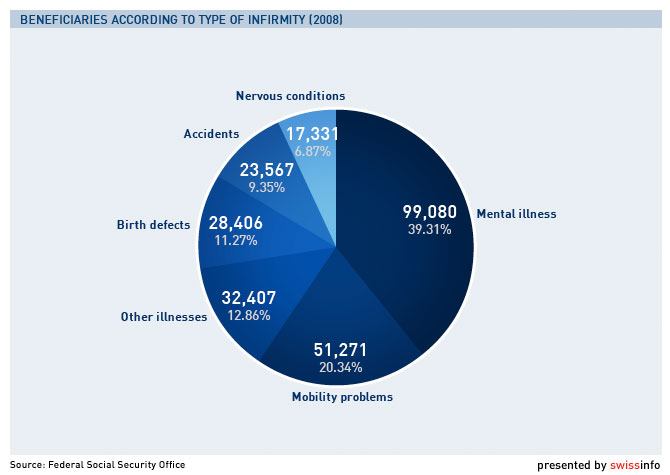
Tax hike for disability scheme scrapes through

A temporary increase in value added tax (VAT) to prop up the state disability insurance scheme has won a majority in a nationwide ballot.
The result is seen as a vote of confidence in the social security system, but also as a mandate to fight abuses and reduce spending.
Final results from Sunday show 54.5 per cent approval among voters and a thin majority of cantons backing an increase in VAT to eight per cent from 2011 to 2018.
Voters in the French- and the Italian-speaking parts of the country approved the 0.4 per cent hike, while those in central and northeastern Switzerland mainly came out against it.
The rightwing Swiss People’s Party was the only major political group to campaign against the fiscal measure, which is aimed at cutting annual deficits of SFr1.4 billion ($1.3 billion). The insurance scheme, which was set up in 1960, also has debts of SFr13 billion.
VAT is currently at 7.6 per cent, with reduced rates for the hotel industry and essential consumer goods.
Speaking on public radio, Claude Longchamp, political scientist at the gfs.berne polling and research institute, said voters in western Switzerland traditionally prefer giving the state a major role in social issues.
He also pointed out that the People’s Party is weaker in the French-speaking part of the country than in German-speaking Switzerland.
Respect
Interior Minister Pascal Couchepin said Sunday’s result proved that voters acknowledged the importance of the issue at stake.
“Supporters acted responsibly and with respect for human values,” he said at a news conference.
Observers say his comments were aimed at opponents who want sweeping spending cuts at the expense of disabled people.
He said the electorate also recognised the steps taken so far by the authorities to reduce the number of new cases of disability payments and to stabilise the overall number of beneficiaries.
Couchepin noted that further measures were in the pipeline to reintegrate an estimated 12,500 disabled people into the job market and reduce spending on insurance payments by about SFr230 million.
Some 300,000 people presently receive disability benefits. There has been an increase in the number of beneficiaries, notably due to mental illness, since the 1990s. It is blamed on rising stress at the workplace and problems related to immigration and poverty.
Stable system
Supporters welcomed Sunday’s result as a sign of support for a stable disability insurance scheme and a step towards a system with a sound financial basis.
“I’m relieved. But it also means that we have to continue efforts to reduce the deficits,” Silvia Schenker from a health umbrella group and member of the centre-left Social Democrats told public radio.
In the run-up to the ballot supporters had warned the country’s social security system, including the old age pension scheme, was in danger if the extra funding was rejected.
They said the vote was a matter of responsibility and solidarity with the disadvantaged.
Pressure
Luzi Stamm of the rightwing Swiss People’s Party said he was disappointed and warned of the need to keep up pressure on beneficiaries abusing the system.
“I fear the pressure for spending cuts will be off. But we have to crack down on fraud, particularly cases of people who live abroad and cheat the insurance scheme,” he said.
His party announced it will present its proposals to adapt payments to beneficiaries abroad by linking it with the local purchasing power.
In their campaign, opponents warned that raising taxes would slow private consumption in Switzerland and put an unfair burden on families.
Urs Geiser, swissinfo.ch
54.5% of voters approved the tax increase against 45.5% no.
Turnout was below average at 40.8%.
In Cantons Zurich, Geneva and Neuchâtel about 15,000 voted via the internet.
About half of the e-votes in Geneva came from registered Swiss abroad.
Voters on Sunday also decided to abolish the so-called general people’s initiative.
67.9% of the electorate voted in favour, 32.1% against it. Turnout was 38.5%.
The special right was introduced only six years ago, but has never been applied since, apparently because it is incompatible with the Swiss parliamentary system.
The special right allowed parliament in principle to decide whether an initiative would result in a constitutional amendment – as is the case with a traditional people’s initiative – or a change in the law.


In compliance with the JTI standards
More: SWI swissinfo.ch certified by the Journalism Trust Initiative






























You can find an overview of ongoing debates with our journalists here . Please join us!
If you want to start a conversation about a topic raised in this article or want to report factual errors, email us at english@swissinfo.ch.